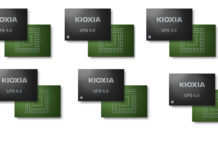Qumulo has updated to its scaleout filer software to support 265 nodes in a cluster, added support for new third-party hybrid NVMe platforms and will add SMB protocol enhancements.
The company supplies scaleout Core filer software that runs on its Qumulo-branded hardware (P, C, K series) and also third-party file storage systems. These can be hybrid NVMe systems, including disk drives and NVMe SSDs. All data on Qumulo is written initially to SSD storage, delivering flash-level write performance. As data ages, Qumulo’s software monitors how often the data is re-accessed, moving it to the HDD layer as it “cools.”

Kiran Bhageshpur, Qumulo CTO, said in a statement: “Customers often feel stuck using a vendor’s exclusive hardware and are subject to price hikes, technological limitations, and even supply chain risk. We enable our customers to use their platform(s) of choice while making data management simple.”
The 265-node limit for a Qumulo cluster is a 165 percent uplift from the previous 100 limit. It means a clusters can scale to higher capacity. However, Qumulo web documentation, “Supported Configurations and Known Limits for Qumulo Core” says the On-Premises Cluster Size limit is 275 nodes while the Cloud Cluster Size limit is 100 nodes. Qumulo said there is documentation error and the upper limit should be 265, not 275. It is being corrected.
Dell PowerScale F900 clusters can be expanded to a maximum of 252 nodes.
A source close to Qumulo told B&F: “There was never any real hard limits for nodes. … For a time [the product management VP] wouldn’t allow anything larger than 50 nodes. Then a customer did it on their own – so they limited it to 100 nodes, and the same thing happened. They put a limit in code and the uplift to 265 is simply based on a customer wanting to grow their nodes beyond the current limitations.”
The uplifted cluster node limit means the maximum cluster capacity has expanded from 34.2PB to 100.7PB, an almost 3x increase. Cluster capacity can vary with the Qumulo model and hardware vendor.
Qumulo says it has added certifications for three new hybrid NVMe platforms offering 35-110 percent greater performance vs existing hybrids. The newly supported systems are:
- HPE Apollo 4200 Gen10+ (as compared to Gen10)
- SuperMicro A+ ASG-1014S-ACR12N4H (no previous hybrid on SuperMicro)
- A whitebox solution from Arrow Electronics, Quiver 1U Gen2 Hybrid (replaces Arrow’s 1U SATA-based hybrid offering)
A Qumulo pitch is that its architecture allows customers to consolidate many workflows onto one system. It says five new workloads will soon be enabled by SMB protocol enhancements and S3 support. These new workloads are:
- 8K Native Video Editorial in the AWS Cloud (SMB MC)
- Philips (formerly Algotec) PACS (SMB MC)
- Media Ingest / Watch Folders (SMB CN)
- Data Analytics with Hadoop/SPARK (S3)
- Hybrid Cloud/Remote Access (S3)
Qumulo CEO Bill Richter said: “Our fundamental vision is to enable massive scale, simple operation, deployable anywhere a customer chooses. Qumulo ensures customers have the freedom to pick where their data resides… Customers can run in the cloud, on-premises in their datacenter, or at the edge.”








